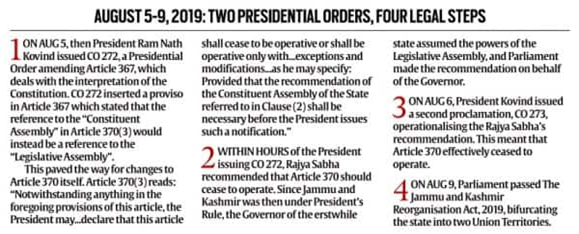

31st August 2023 (9 Topics)
Context
The recent hearings by the Supreme Court (SC) on arguments by petitioners challenging the abrogation of Article 370 of the Constitution, is ended and now the government will have to answer those allegations and prove their ground.
Background

What are the allegations against abrogation of Article 370?
- Validity of Constitutional Order (CO) 272:
- Petitioners claimed Article 370's permanence, suggesting it's not terminable by President.
- Constituent Assembly's Role: It was also argued that there is temporary reference of Article 370 related to Constituent Assembly's power for changes.
- J&K Constitution Impact: Article 147 grants permanence after Constituent Assembly's dissolution, barring changes to Indian Constitution application.
- Limitations of Article 367: Petitioners claimed CO 272 used Article 367 interpretatively, exceeding its amendment scope defined by Article 368.
- No Abrogation via order 272: Argued neither J&K Assembly nor Parliament could undo Article 370 using Constitutional order 272.
- Validity of Order 273:
- President's proclamation confirmed Article 370 abrogation, linked to Governor's move.
- Petitioners contended that Rajya Sabha couldn't assume Governor's powers under Article 356 without Assembly authority.
- Governor's Role under President's Rule: Petitioners criticized 2018 events, where Governor dissolved Assembly unlawfully without cabinet's aid and advice.
- The improper basis for Governor's actions, leads to unlawful President's Rule proclamation without government in place.
- On Governor’s Rule:
- While not disputing Governor's Rule or President's Rule, the argument was made to show Rajya Sabha's powers assumption during President's Rule as unlawful.
- Petitioners’ claimed it amounted to a "fraud on the Constitution," as Article 370 safeguards couldn't be erased by Article 356's imposition of President's Rule.
What is government’s stand to remove Article 370?
- The Government of India's stand on the abrogation of Article 370 is that it was a necessary step for the integration and development of the region of Jammu and Kashmir.
- The government asserts that the special provisions under Article 370 were hindering the region's progress and preventing the extension of various central laws and benefits to the people of Jammu and Kashmir.
- The abrogation of Article 370 and the reorganization of the state into two union territories, Jammu and Kashmir, and Ladakh, are aimed at promoting socio-economic development, ensuring better governance, and addressing security concerns.
- The government believes that the move will lead to greater investment, job opportunities, and overall growth in the region.
Constitutional backing for government’s move:
- Under Article 370(3): The constitutional basis for the Indian government to remove Article 370 was provided by Article 370(3) itself, which allowed the President of India to modify or cease the operation of Article 370 by a public notification, with the concurrence of the Constituent Assembly of Jammu and Kashmir.
- However, since the Constituent Assembly had already dissolved in 1957, the government argued that the provision was rendered inoperative, and the President's Order of August 5, 2019, effectively abrogated Article 370 and related provisions.
- This decision was supported by the Parliament's approval and the reorganization of the state into two union territories through the Jammu and Kashmir Reorganization Act, 2019.
More Articles



